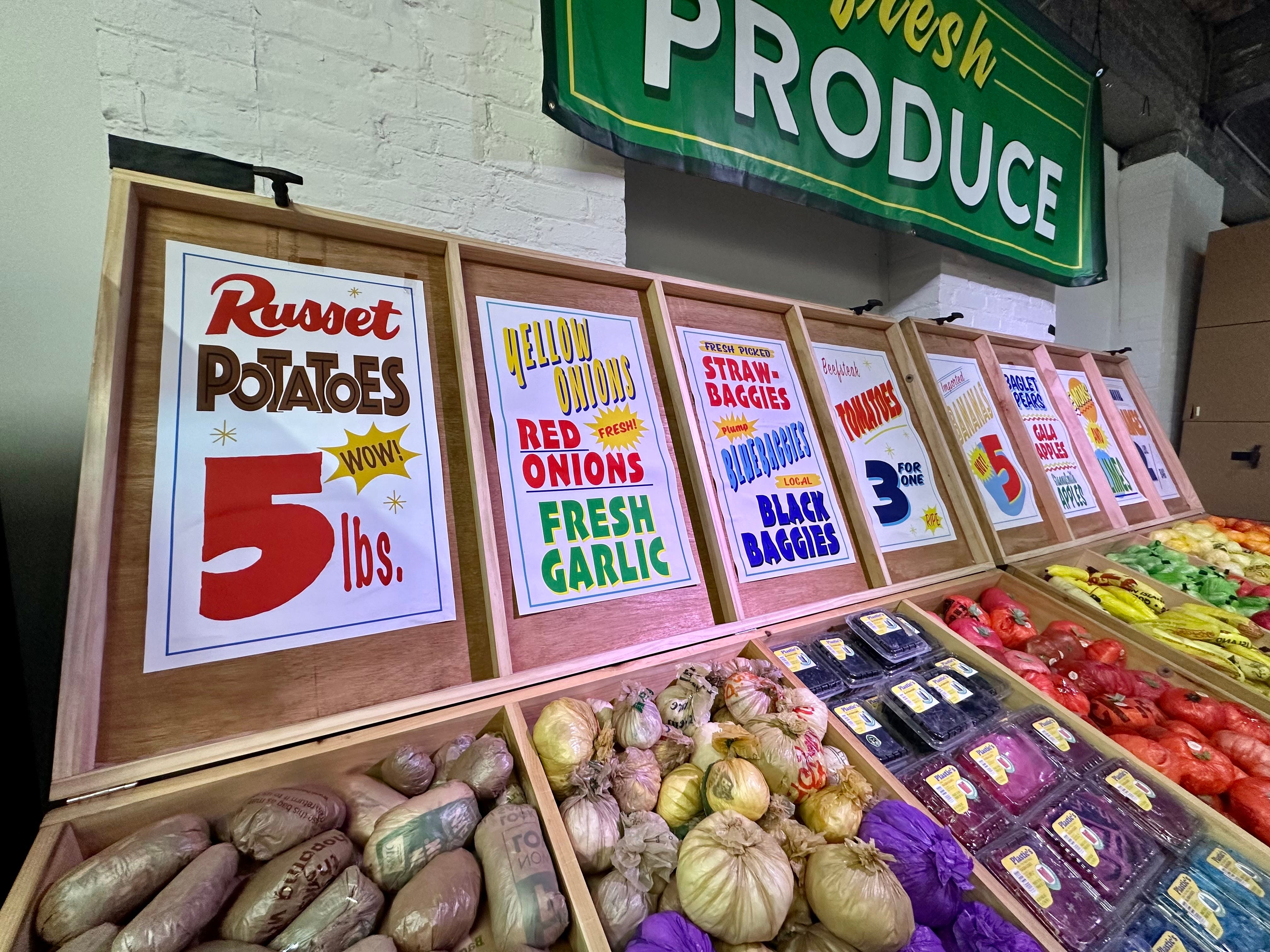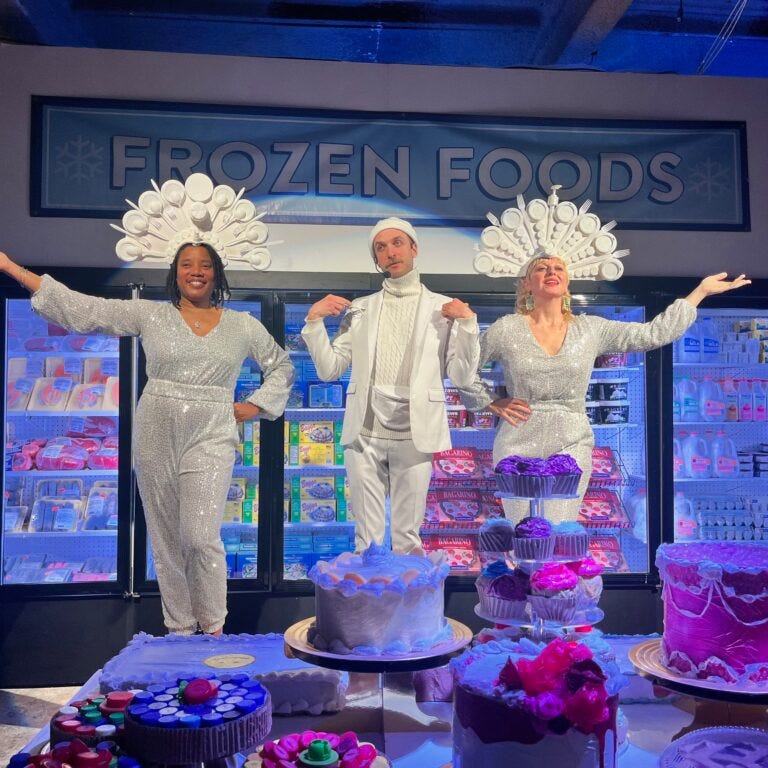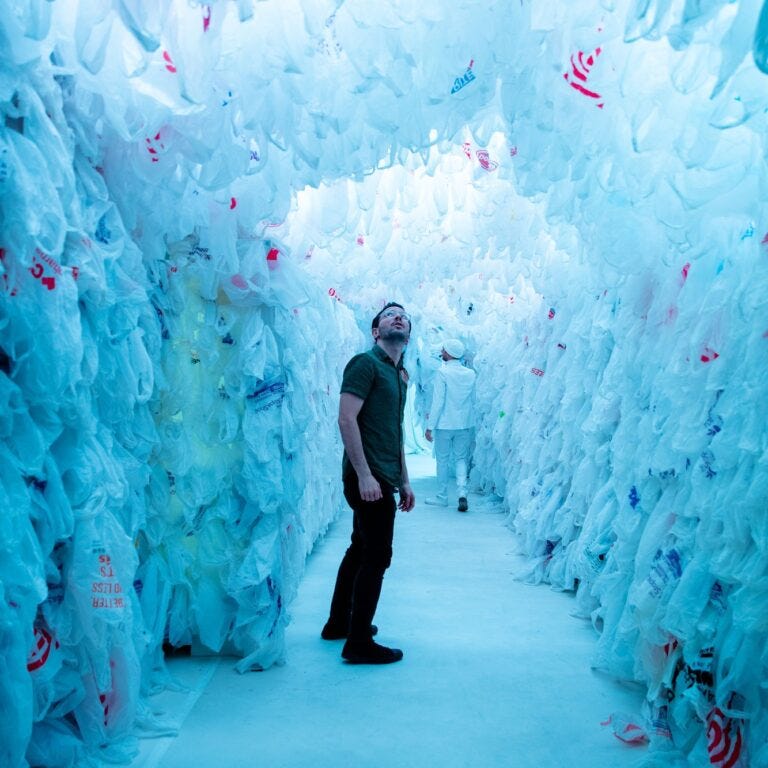The Power of Plastic Parody (REVIEW)
The Plastic Bag Store at MASS MoCA


Giant yellow signs wink at you from the third floor of an industrial building. They look familiar, but look closer. These aren’t ads for Cap’n Crunch; they’re hawking a plastic trash parody of the cereal — Caps’n Such. Cheerful red and yellow lettering (Thank You for Shopping!) lets you know that you’re approaching a grocery store. Probably.
The Plastic Bag Store at MASS MoCA is a clever and impactful immersive installation. It starts as a satirical grocery store filled with plastic parodies, drawing you in with humor and creativity. But it quickly becomes so much more, transforming into a multi-dimensional theatrical experience. Created by artist Robin Frohardt, it first premiered in NYC in 2020 and is now showing at MASS MoCA as part of their ongoing exploration of socially impactful immersive art.
MASS MoCA’s immersive chops
The Massachusetts Museum of Contemporary Art (MASS MoCA) is a mecca for immersive art, showcasing works from legends like James Turrell, Sol LeWitt, and Laurie Anderson. It’s also a breeding ground for pieces like Where I End & You Begin, an experimental audiowalk from Punchdrunk collaborators Alli Ross and John Bechtold (more on this in a future review). It’s a playground for environmental audio, a campus for small business, and the perfect place for festivals like Bang on a Can’s LOUD Weekend or Wilco’s Solid Sound.
The museum’s sprawling campus, built on the site of a 19th-century factory, offers warehouse-scale levels of possibility. The museum has featured everything from E. J. Hill’s one-person roller coaster, Brake Run Helix, to Chris Doyle’s city-block-sized video installation, The Coast of Industry (on view now). Setting up an installation in the form of a literal full-size shop wasn’t out of the question.
I love MASS MoCA. So, I was in a good mood, despite having driven 3+ hours in the rain, when I arrived at The Plastic Bag Store.
Thank you for shopping!
Plastic bag potatoes; cakes made of bottle caps; copies of “Bags Illustrated” line the magazine racks. It’s silly, but technically kind of amazing. And it’s a lot of fun. I enjoyed wandering fake aisles stocked by fake employees (museum docents trained as immersive actors) noticing all the ways creator Robin Frohardt turns everyday products on their head.

It’s also depressing. The world is dying. We’re choking it with plastic that will never degrade. If The Plastic Bag Store had stopped here, with its sharp satire of modern consumerism, I would have felt cheated by art telling truths I’d already absorbed.
But there’s so much more to this little faux-grocery! After going about their business while visitors fake-shopped for fake products, blue-aproned employees jumped into action, rearranging aisles to make room for a screen. The fluorescent lights went down, and suddenly, the store became a theatre. And we were treated to one of the most beautiful displays of puppetry I’ve ever seen.
More than meets the eye
Now’s a good time to mention that The Plastic Bag Store is more than a solid piece of eco-conscious installation art. It’s an hour-long event that never lets you linger too long in any one reality. One minute, you’re in on the joke about the horrors of consumerism. The next, you’re watching a shadow play that connects ancient Greek parables to a museum janitor in Troy, NY. It’s so easy to lose yourself in that narrative. And I did! I felt like a kid, delighted to be wrapped up in the calming ritual of story time.
Until I noticed a glow coming from the frozen foods section. The freezer doors opened and employees ushered us into a pristine ice cave. I don’t think it actually got colder behind those Bagarino brand frozen “pizzas,” but still.
Get Leah Davis’s stories in your inbox
Join Medium for free to get updates from this writer.
SubscribeSubscribe
The walls, it turns out, were not ice. They were, unsurprisingly, plastic bags. Hundreds of them. Thousands! And they were beautiful. White, for the most part, but if you looked close enough, you could see sayings. Faded blue roses. A smiley face. I sat myself on a sterile white stool at the far end of the cave as people filed in. Once again, the lights dimmed.
This time, the film threw us into the future, showing us a ruined world where people live on jellyfish and cockroach rations. We watch as a scientist finds the note in a bottle left by our present-day janitor. In a tragi-comic turn of events, her words have faded into nothingness over the centuries, but the receipt she wrote them on is just barely visible: “Most Valued Customer.”
The conclusions drawn by our scientist are funny; he decides that people from our time must have held plastic in high regard, that the “Most Valued Customer” was a shaman or a god, and that convenience stores were places of worship. He has all sorts of upside-down ideas about what various plastic bits and bobs (worn down and only semi-recognizable in his time) might have been used for, and witnessing his straight-faced reports lets us in on the joke once again.
But his reverence for his discoveries; his underwater-under-ice exploration of the ruins of NYC; his genuine love for a past that he thinks must have been so vibrant (yes!) and noble (no!) pulls us up short. Are we worthy of the future’s love? We know the answer, but The Plastic Bag Store makes us want to be better.

YOU’RE the Most Valued Customer
The Plastic Bag Store’s final act is their “Museum of the Most Valued Customer,” founded by our future scientist. This one’s another physical space, not a film, and it’s hosted by docents wearing lab coats and headdresses made of plastic cutlery. They seriously describe “ancient” items like combs and lighter chassis poorly before telling us they’ve extended their founder’s research by creating the world’s largest simulation of what it must have been like to live in the 2020s… and that, by walking out that door, we would be able to continue exploring that simulation for the rest of our lives.
It was a clever bit of time travel. And it led us right back into the original Plastic Bag Store space. We were allowed to look around the space a little longer, this time with fresh eyes.
I didn’t leave with answers and I wasn’t sure there was anything I could actually do to make the future we had just witnessed any better. But I loved The Plastic Bag Store for being so much deeper than I first gave it credit for.
Life after plastic
Funny story: after leaving The Plastic Bag Store, I walked across campus to pick up dinner before driving home. I thought about what I had just experienced while I waited. And when my fries came out, they were in a big plastic container, with a plastic fork and knife sealed in a little plastic baggie.
I didn’t know what to do with myself, so I ate my fries and looked up at those big yellow signs, wondering if there was any way to live in the world without becoming a Most Valued Customer.
The Plastic Bag Store—MASS MoCA Tickets $25 (purchase with MASS MoCA admission or as a stand-alone ticket); North Adams, MA; 5/9–9/2/2024
Leah Davis is a writer & editor at No Proscenium.
Discover the latest immersive events, festivals, workshops, and more at our new site EVERYTHING IMMERSIVE, home of NoPro’s show listings.
NoPro is a labor of love made possible by our generous Patreon backers. Join them today and get access to our Newsletter and Discord!
In addition to the No Proscenium website and our podcast, and you can find NoPro on Facebook, LinkedIn, YouTube, Instagram, and in the Facebook community also named Everything Immersive.